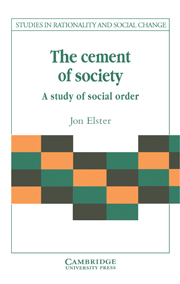Book contents
2 - Bargaining
Published online by Cambridge University Press: 09 January 2010
Summary
Introduction
Bargaining occurs when there are several cooperative arrangements and the parties have conflicting preferences over them. By a cooperative arrangement I mean any outcome (a) that is better for everybody than the state of anarchy, (b) in which there are no exploiters, defined as noncooperators whose cooperation would cost them less than it would benefit them and others, and (c) in which nobody ends up being exploited, that is, as a cooperator whose cooperation costs him more than it benefits himself and others. By anarchy I mean, following the typology of cooperation set out in the Introduction, the absence of any of the following: actions with positive externalities, helping, a convention equilibrium, a feasible joint venture or a private ordering.
The parties are assumed, that is, to have a common interest in arriving at some agreement but a conflict of interest over which agreement that is to be. The central problem of bargaining, in theory and practice, is that the very plurality of cooperative arrangements may prevent any of them from coming about. Bargaining differs from the narrowly defined collective action problem, in which there is typically a unique cooperative arrangement: that in which everybody participates equally. It also differs from cases in which there are several cooperative arrangements, but no conflict of interest, either because all are indifferent among the arrangements or because one of them is better for everybody than the others.
Bargaining must be distinguished from attempts to reach agreement by rational discussion. One way of characterizing the latter is as bargaining in which strategic misrepresentation and other forms of jockeying for position are not allowed.
- Type
- Chapter
- Information
- The Cement of SocietyA Survey of Social Order, pp. 50 - 96Publisher: Cambridge University PressPrint publication year: 1989



